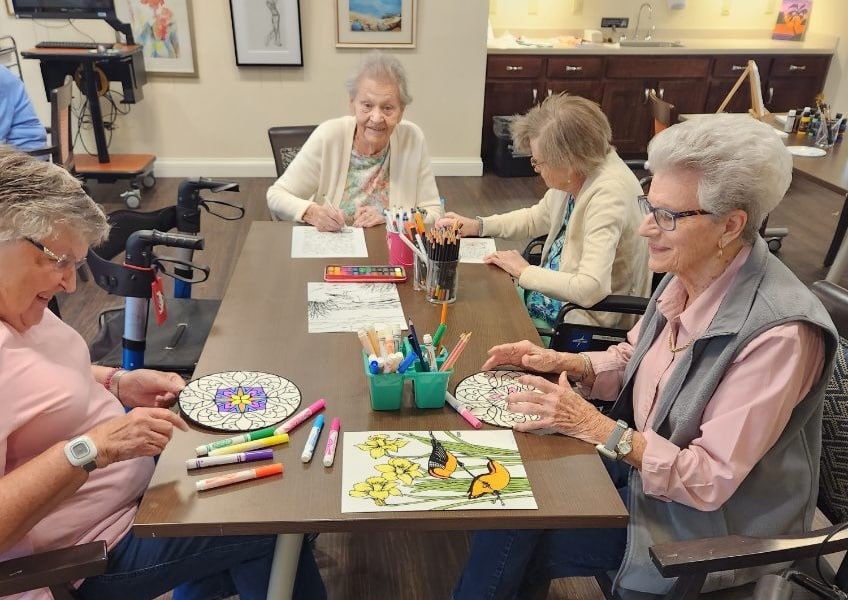As we age, once simple tasks like home maintenance can become increasingly challenging. This difficulty is magnified for individuals living with Alzheimer’s or another form of dementia. It’s a prevalent health concern among older adults –The Alzheimer’s Association claims that 720,000 Florida residents will have this form of memory loss by 2025.
Forgetfulness at any age is normal, but cognitive decline interfering with everyday activities and home ownership is not; understanding when memory care is needed is essential.
It’s heartbreaking for family members to watch a loved one struggle with tasks they used to manage with ease. You may be grappling with concerns about their well-being and wondering if it’s time for them to transition from home or move from assisted living to memory care.
Facing the challenges of aging and memory loss is no easy task, and it’s natural to feel concerned and unsure about the next steps. You’re not alone in this journey. At The Harrison of Wildwood, we realize how much you care about your loved one’s well-being and empathize with your desire to do what’s best for them.

It’s okay to ask for help and seek professional guidance; after all, this decision is about ensuring your family member’s happiness and quality of life. Join us as we explore signs indicating it’s time to consider memory care. We’ll also share thoughtful ways to approach the sensitive conversation of how to move a family member to memory care.
weight loss
transition to memory care
Start Here: Ten Signs It’s Time For Memory Care
It is crucial to recognize when it’s time to explore what memory care communities offer. Here are ten signs that indicate it might be time:
1. Increased Forgetfulness: Missing important appointments or forgetting medications can indicate that more structured support is needed.
2. Accident Concerns: A memory care facility offers a supervised environment if leaving the stove on or getting lost in familiar places becomes common.
3. Difficulty with Daily Tasks: Struggling with basic personal care, like bathing or dressing, indicates that additional help is necessary.
4. Changes in Behavior: Look for significant mood swings, withdrawal, or aggression that’s out of character.
5. Physical Health Decline: Noticeable weight loss or neglect of their health suggests they might need these communities’ comprehensive care.
6. Caregiver Stress: If the health and well-being of the primary caregiver are at risk, it’s time to consider other options.
7. Social Withdrawal: Abandoning hobbies or social activities could indicate that they would benefit from the socialization a memory care facility provides.
8. Home Upkeep Difficulties: An unclean or disorganized living space can show they’re overwhelmed by daily tasks.
9. Wandering: If they often try to wander away from home, they need the secure environment of a memory care community.
10. Financial Mismanagement: Unpaid bills or unexplained spending could mean it’s unsafe for them to manage their finances alone.
Understanding these signs can make the transition to memory care smoother, ensuring your loved one receives the supportive and compassionate care they deserve.
Recognizing When It’s Time for Memory Care for A Loved One
Identifying the signs of cognitive decline is the first step in determining when it’s time for memory care. They can vary from person to person, but there are common indicators.
Memory loss that disrupts daily life is a key sign of Alzheimer’s or another form of dementia. An example could be forgetting recent events or frequently repeating the same questions and stories. It’s normal to forget appointments or misplace things occasionally, but when it starts becoming a pattern, it might indicate a more serious issue.
Additional signs of how to know when memory care is needed include:
- Changes in personality, mood, and behavior
- Symptoms of depression, anxiety, or aggression
- A decreased ability to plan and carry out complex tasks
- Showing difficulty interpreting their environment
As dementia progresses, it impacts more than just memory.
In the early stages of dementia, a person may still perform activities of daily living. However, these abilities can be significantly impaired as dementia advances into the moderate stage. They may struggle with tasks such as:
- Managing finances
- Maintaining personal hygiene
- Preparing meals
Understanding visual images and spatial relations can become challenging, leading to difficulties with balance or judging distance. That can result in tripping over things at home, spilling hot coffee, or other similar accidents.
How to Move a Family Member to Memory Care When There’s Caregiver Burnout
Being a caregiver for a loved one with dementia is a labor of love, but it’s not without its challenges. This role can be physically demanding and emotionally draining.
It’s important to recognize when the care you’re providing at home might be less than what professional memory care can offer—both for your loved one and for your own well-being. Over time, it can affect physical, mental, and personal health. If you’re always overwhelmed or stressed, it could be a sign that it’s time to consider memory care.
You might also feel like your loved one’s needs are becoming more than you can handle, especially if their form of dementia is progressing to a more advanced stage. Caregiving involves many tasks that can be difficult to accomplish daily:
- Managing medications
- Supervision to prevent wandering
- Assisting with daily activities and personal care
- Providing activities and exercise
- Cooking nutritious meals
- Transportation to appointments
- Ensuring they are mentally and socially stimulated
When those tasks become too challenging or time-consuming, professional memory care from a community like The Harrison of Wildwood could be the best solution.
It’s also important to consider your own needs and responsibilities. Remember, taking care of yourself is not a luxury—it’s a necessity. Prioritizing your well-being puts you in a better position to support your loved one.
Choosing memory care for a loved one is not an admission of failure or a lack of love. On the contrary, it’s an act of deep compassion and understanding. It’s about recognizing the complexity of dementia and the level of care it requires—support that professional memory care communities are equipped to provide.
How to Tell Mom She’s Moving to Memory Care
Conversations about moving to memory care with a loved one can feel intimidating – it’s a sensitive topic that requires a gentle, empathetic approach. Remember that each person’s journey is unique, so be patient, understanding, and open-minded. These conversations may need to happen more than once, and that’s okay.
Here are seven reminders when having the conversations:
- Choose the Right Setting. Opt for a quiet, comfortable environment where your loved one feels safe and at ease; avoid public places where distractions could make the conversation more difficult.
- Use Compassionate Language. Use kind, empathetic language: Instead of using phrases like “putting you in a nursing home,” use terms like “finding a new living arrangement where you can receive the best care.”
- Avoid Rushing the Conversation. These discussions should not be hurried. Ease into the topic and give your loved one plenty of time to process the information and ask questions.
- Be Patient and Receptive. Your loved one may react with denial, anger, or fear. Be patient and listen to their concerns without becoming defensive.
- Involve Them in the Decision. When possible, involve your loved one in the decision-making process. This could include visiting potential memory care communities together or discussing which features they would find most beneficial.
- Avoid Confrontation. If the conversation becomes too heated or stressful, pausing and revisiting the topic might be best. It’s essential to keep the conversation positive and supportive.
- Seek Professional Guidance. Don’t hesitate to seek advice from professionals who have dementia care experience. They can offer valuable guidance on handling these sensitive discussions.
Depending on their current living situation, here are some questions to guide you when discussing a move to memory care with a family member.
Do they live alone in a home or apartment?
If your loved one lives alone and is showing signs of dementia, it’s important to start the conversation early.
You might say, “Mom, I’ve noticed you’ve been having some trouble remembering things lately. I think it might be good for you to live somewhere where there’s always someone to help you if you need it.”
Emphasize the positives of memory care, such as professional support, social opportunities, and well-being opportunities. Visit a doctor together for an accurate diagnosis; that also makes transitioning from in-home care easier.
Does Mom or Dad receive in-home care?
If your parent is already receiving in-home care, but their needs have outgrown what can be provided at home, the conversation may be different.
You could say, “Mom, I’ve been talking with your caregivers, and they think you might benefit from a place that specializes in helping people who have trouble with their memory.”
Explain that memory care communities have specially trained caregivers who understand the unique challenges of dementia.
Does a spouse live in an independent living or assisted living community?
This living arrangement can make transitioning from assisted living to memory care a delicate situation. Start by explaining why assisted living might not be enough anymore. You could say, “Assisted living has been great for us, but I think you might need a little more help than they can provide. I will still be here for you.”
Discuss how memory care offers more specialized care for individuals with Alzheimer’s or dementia, including structured activities and personalized care plans.
Assisted living is an essential senior care service, but it often does not provide the supervision and support needed for people with memory loss. Communities like The Harrison of Wildwood, offer both lifestyle options to make this transition smoother.
We’re Here For You When It’s Time For Memory Care in Wildwood, FL
Knowing how to move a family member to memory care is never easy, but The Harrison of Wildwood offers support every step of the way. Our memory care community is designed with your loved ones at heart, providing personalized care tailored to their unique needs.
Remember, you’re not alone in this journey. When it’s time for memory care for a loved one, contact us to arrange a tour of The Harrison of Wildwood.







